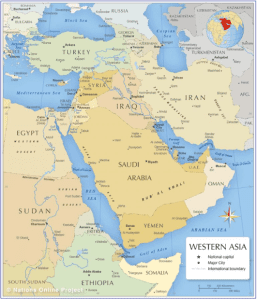THE CONTEXT: The escalating conflict between Israel and Hezbollah has intensified regional tensions, threatening to spiral into a broader war. This complex situation demands urgent and multifaceted solutions to prevent further destabilization in West Asia.

THE ISSUES:
- Escalation of Regional Conflict: The ongoing conflict between Israel and Hezbollah has seen significant escalation, with exchanges of missile fire and airstrikes raising fears of a broader regional war. This tension is further exacerbated by the involvement of Iran, which supports both Hezbollah and Hamas, potentially drawing in other regional actors such as Syria and Iraq’s Iran-backed militias.
- Hezbollah’s Retaliation and Israel’s Pre-emptive Strikes: The recent escalation was triggered by the assassination of Fuad Shukr, a senior Hezbollah commander, by Israel. In response, Hezbollah launched a significant attack involving rockets and drones targeting Israeli military sites. Israel’s preemptive strike aimed to thwart a larger planned assault by Hezbollah, showcasing the cycle of retaliation and preemptive actions.
- Impact on Civilian Populations: The conflict has resulted in significant casualties and displacement on both sides. Tens of thousands have been displaced in Lebanon and northern Israel due to the ongoing hostilities, with civilian areas being affected by the cross-border attacks.
- Diplomatic Efforts and International Involvement: International actors, including the United States, have been actively working to de-escalate the situation. U.S. President Joe Biden sent his special envoy to the region to prevent a full-scale conflict, while European leaders have also expressed concerns about the potential for an all-out war.
- Strategic and Military Considerations: The conflict underscores the strategic challenges Israel faces in dealing with Hezbollah, which is well-armed with an estimated 150,000 rockets capable of reaching anywhere inside Israel. Despite Israel’s advanced military capabilities, including a comprehensive missile defense system, Hezbollah’s resilience suggests that a military solution is elusive.
- Broader Implications for the Middle East: The conflict between Israel and Hezbollah is part of a larger regional dynamic involving the ongoing war in Gaza and tensions with Iran. The situation remains volatile, with the potential for further escalations that could draw in additional regional actors and complicate efforts to achieve stability. The broader implications also include potential disruptions to global oil supplies, given the Middle East’s role in energy production.
THE WAY FORWARD:
- Diplomatic Engagement and Ceasefire Agreements: Initiate diplomatic talks to establish a ceasefire between Israel and Hezbollah, potentially mediated by international organizations or influential states. Diplomatic solutions have been deemed achievable to prevent war between Israel and Hezbollah. Historical precedents, such as the Camp David Accords and Oslo Accords, show that diplomacy can lead to significant peace agreements. The 1949 Armistice Agreements and the Arab League peace plan are examples of successful diplomatic interventions in the region.
- Strengthening UNIFIL’s Mandate: Enhance the mandate of the United Nations Interim Force in Lebanon (UNIFIL) to allow for enforcement actions against armed groups in southern Lebanon. UNIFIL’s current limited mandate has been criticized for its inability to effectively disarm Hezbollah. Empowering UNIFIL could help enforce UN Security Council Resolution, which calls for the disarmament of Hezbollah and the demilitarization of southern Lebanon. The successful enforcement of peace by UN forces in other regions, such as in Cyprus, demonstrates the potential effectiveness of a robust UN mandate.
- Economic and Social Development Initiatives: Implement economic and social development programs in Lebanon to address poverty and inequality, which can reduce support for militant groups like Hezbollah. Addressing root causes of conflict, such as poverty and injustice, can promote long-term peace and stability. Economic development can weaken Hezbollah’s influence by improving living conditions and reducing reliance on the group for social services. International aid and development programs in post-conflict regions have successfully reduced tensions and fostered peace, as seen in post-war Europe with the Marshall Plan.
- Confidence-Building Measures: Establish confidence-building measures between Israel and Lebanon, such as military de-escalation zones or joint humanitarian projects. Building trust through dialogue and cooperation can reduce the likelihood of conflict escalation. Confidence-building measures have been effective in other conflict zones, such as the Korean Demilitarized Zone. The Good Friday Agreement in Northern Ireland included confidence-building measures that helped end decades of conflict.
- Regional Security Framework: Develop a regional security framework involving key stakeholders, including Israel, Lebanon, Iran, and Arab states, to address security concerns and prevent unilateral military actions. Such frameworks have been proposed in the past, like the Arab Peace Initiative. The Helsinki Accords created a framework for security cooperation in Europe during the Cold War, reducing tensions between NATO and Warsaw Pact countries.
- International Pressure and Sanctions: Apply international pressure and targeted sanctions on parties that violate ceasefires or engage in aggressive actions, while offering incentives for compliance. Sanctions can deter aggressive behavior by increasing the economic and political costs of conflict. Incentives, such as economic aid or diplomatic recognition, can encourage compliance with peace agreements. Sanctions have been used effectively in negotiations with Iran over its nuclear program, leading to the Joint Comprehensive Plan of Action (JCPOA).
THE CONCLUSION:
Addressing the Israel-Hezbollah conflict requires a combination of diplomatic efforts, regional cooperation, and strategic interventions. By implementing comprehensive solutions, the path towards lasting peace and stability in the region can be forged.
UPSC PAST YEAR QUESTIONS:
Q.1 The question of India’s Energy Security constitutes the most important part of India’s economic progress. Analyze India’s energy policy cooperation with West Asian Countries. 2017
Q.2 A number or outside powers have entrenched themselves in Central Asia, which is a zone to interest to India. Discuss the implications, in this context, of India’s joining the Ashgabat Agreement, 2018. 2018
MAINS PRACTICE QUESTION:
Q.1 Discuss the implications of the escalating conflict between Israel and Hezbollah on regional stability in West Asia. Evaluate potential solutions to mitigate the conflict, considering diplomatic, military, and socio-economic dimensions.
SOURCE:
Spread the Word



